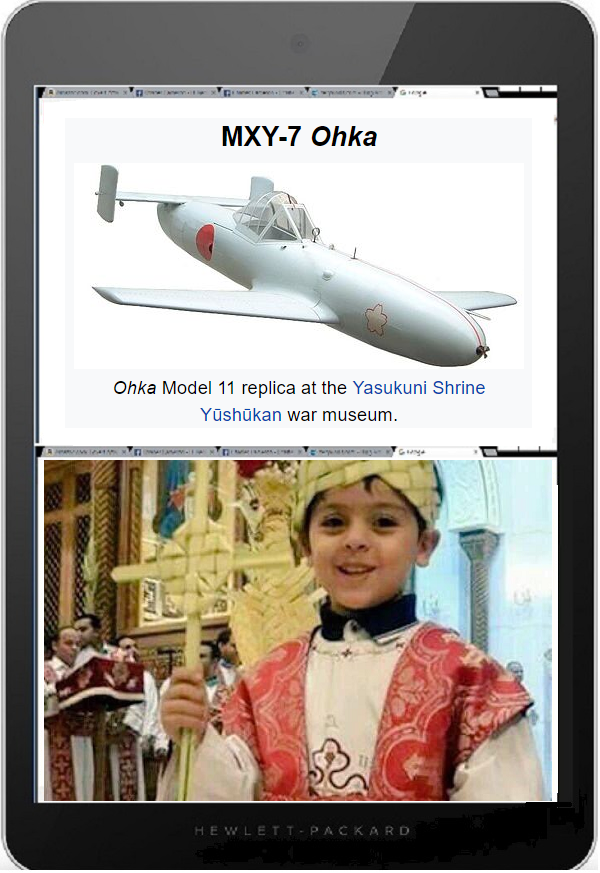Cherry blossom season 02
[ by Charles Cameron — cherry blossoms and kamikaze, Palm Sunday and istishhad ]
.
It’s cherry blossom season, it’s Palm Sunday. Blossoms fall, while temporary followers of Christ — they’ll abandon him to crucifixion later in the week — celebrate Christ’s arrival in Jerusalem strewing palm leaves at this feet.
**
In the upper panel, Japanese self-sacrifice with intent to kill Americans:
The Yokosuka MXY-7 Ohka (“cherry blossom”) was a purpose-built, rocket powered human-guided anti-shipping kamikaze attack aircraft employed by Japan towards the end of World War II
Kamikaze pilots — the term translates to “divine wind” — drew strong associations between the transience of cherry blossoms and their own lives.
From WIkipedia:
The names of four sub-units within the Kamikaze Special Attack Force were Unit Shikishima, Unit Yamato, Unit Asahi, and Unit Yamazakura.[22] These names were taken from a patriotic death poem, Shikishima no Yamato-gokoro wo hito towaba, asahi ni niou yamazakura bana by the Japanese classical scholar, Motoori Norinaga. The poem reads:
If someone asks about the Yamato spirit [Spirit of Old/True Japan] of Shikishima [a poetic name for Japan] — it is the flowers of yamazakura [mountain cherry blossom] that are fragrant in the Asahi [rising sun].
From Emiko Ohnuki-Tierney, Kamikaze Diaries: Reflections of Japanese Student Soldiers:
As Hayashi entered the military and struggled to come to terms with death, he came to identify himself with cherry blossoms. In a letter to his mother, he laments his fate: the cherry blossoms at the Wo?n-san Base in Korea, where he was stationed, have already fallen, and yet the time for his sortie has not come. To his younger brother he writes from the Kanoya Base: “Cherry blossoms are blooming and I am going” (90). Hayashi consciously draws an analogy between himself and the fl owers; their falling signifi es the time for his death.
Other people also used the metaphor of cherry blossoms to refer to Hayashi. A poem written by his mother after the end of the war contains the idiomatic expression the “falling of my son,” applying the word conventionally used for the falling of cherry petals to the death of Ichizo¯. Hayashi’s friend Hidemura Senzo¯ laments that “Hayashi’s youth is fallen,” like cherry petals, but adds: “Peace arrived but not the peace you wished to bring through your sacrifi ce; it is only in the miserable aftermath of defeat.” Hidemura concludes, “Beauty appears in a sensitive vessel and life is short” (143–47).
See also: Ohnuki-Tierney, Emiko (2002). Kamikaze, Cherry Blossoms, and Nationalisms: The Militarization of Aesthetics in Japanese History.
**
In the lower panel, the face of a child killed in the ISIS-claimed suicide bombing of a church in Egypt this Palm Sunday, following an earlier ISIS announcment that they would be targeting Egyptian (Coptic) Christians.
ISIS Claims 2 Deadly Explosions at Egyptian Coptic Churches on Palm Sunday
TANTA, Egypt — Islamic State suicide bombers attacked two Coptic churches in Egypt on Palm Sunday, killing at least 40 worshipers and police officers stationed outside in the deadliest day of violence against Christians in the country in decades.
The militant group claimed responsibility for both attacks in a statement via its Aamaq news agency, having recently signaled its intention to escalate a campaign of violence against Egyptian Christians.
The first explosion occurred about 9:30 at St. George’s Church in the Nile Delta city of Tanta, 50 miles north of Cairo, during a Palm Sunday Mass. Security officials and a witness said that a suicide bomber had barged past security measures and detonated his explosives in the front pews, near the altar.
At least 27 people were killed and 71 others injured, officials said.
Hours later, a second explosion occurred at the gates of St. Mark’s Cathedral in the coastal city of Alexandria. That blast killed 13 people and wounded 21 more, the Health Ministry said.
The patriarch of the Egyptian Coptic Church, Pope Tawadros II, who is to meet with Pope Francis on his visit to Egypt on April 28 and 29, was in the church at the time but was not injured, the Interior Ministry said.
See also:
‘God gave orders to kill every infidel’ ISIS vows to massacre Christians in chilling video<
**
The joyous palm leaves of Sunday, greeting Christ‘s arrival in Jerusalem, will ritually and symbolically turn to ashes later in the week, as the adoring crowd turns vicious and demands his crucifixion.





April 9th, 2017 at 7:20 pm
Cherry blossom and Kamikazes always make me think of a scene in the little-remembered 90s series Space:Above and Beyond:
McQueen keeps a copy of a poem by a Japanese Kamikaze pilot in his flightsuit:
.
“With my mission now at hand, my dear old town, my dear old people, I now abandon everything and leave to protect this country. To preserve our eternal and just cause, I now go forth. My body will collapse like a falling cherry blossom but my soul will live and protect this land forever. Farewell. I am a glorious wild cherry blossom. I shall return to my mother’s place and bloom.”
– Mayumi Ichikawa.
.
to remind him that “[the man] died foolishly. He gave his life in a lost cause.” This is a neat reversal of McQueen’s usual admiration for the historical figures he studies and prompts a nice moment where Hawkes, last to volunteer, says slowly, “I ain’t no kamikaze…” and when the faces of his colleagues fall he finishes with “’cause I’m coming back!” It is easy to scoff at chest-thumping moments like this but it really is very touching and utterly true to the character.
http://boltax.blogspot.com/2011/05/this-is-lieutenant-nathan-west-58th.html